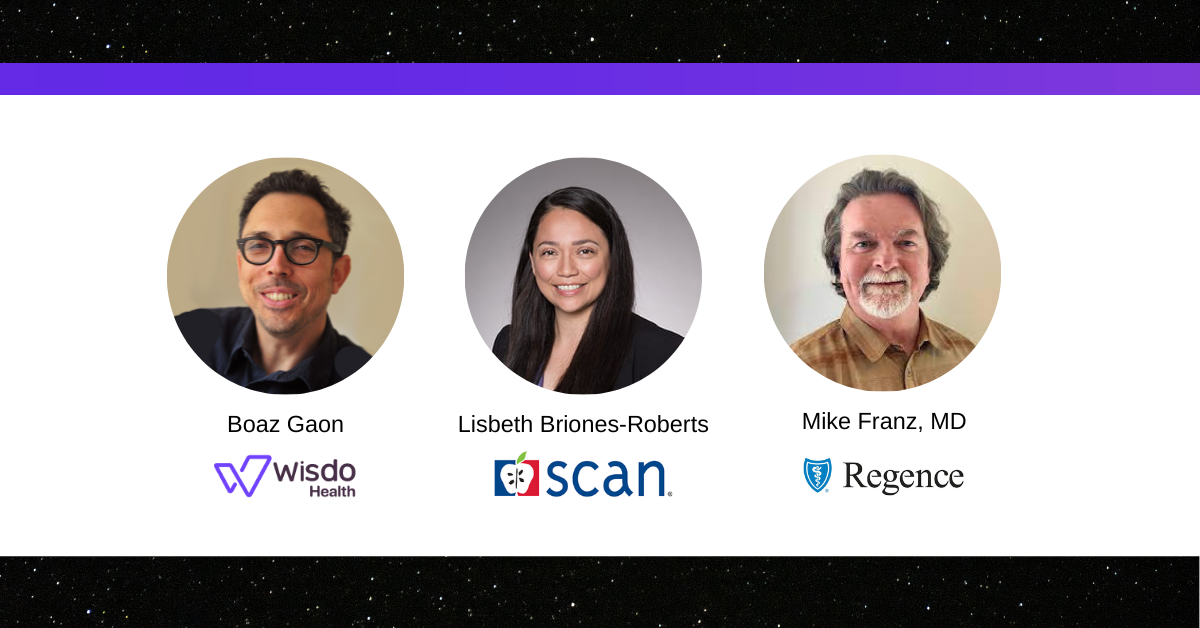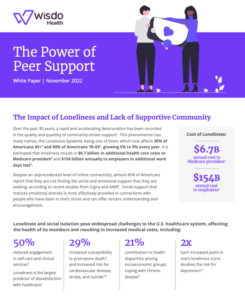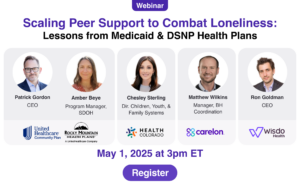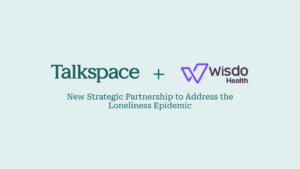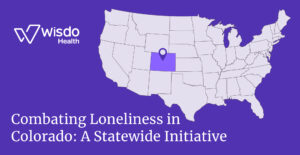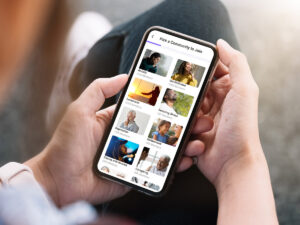On November 17, 2022, we participated in a webinar titled “Peer Support to Improve Medicare Advantage Outcomes” about how forward-thinking health plans are integrating peer support programs into their member experience as an important tactic to improve health outcomes, reduce medical costs and improve Stars ratings.
The webinar included Lisbeth Roberts, Chief Togetherness Officer at SCAN Health, Dr. Mike Franz, Senior Medical Director of Behavior Health, and Boaz Gaon, Wisdo’s founder and CEO. The webinar was moderated by Eric Glazer from Bright Spots in Healthcare.
Regence BlueCross BlueShield’s Peer Support Professional Integration
Dr. Mike Franz shared that Regence has employed a staff of peer support professionals to work alongside their case management teams. These peers have received training and offer tips on navigating healthcare based on chronic illness, including behavioral health challenges to their members and notify case management teams of any additional health needs a member may have.
Being that peers are not part of the clinical staff, members feel more comfortable, and “move from hopelessness to hope” in their recovery journey. As Dr. Franz put it, peers are Regence’s ”secret sauce to engagement.”
When asked why Regence chose to engage peers, Dr. Franz said, “It’s because the evidence of what peers can do for members and health plans is just overwhelming.”
He referred to the studies that have demonstrated peers can reduce emergency department admissions, inpatient admissions, and the length of stays, as well as keep members active in the community longer. “This is important for quality of life, and they reduce total cost of care. So, that’s the bottom line: improving outcomes and reducing costs.”

SCAN Health’s Tailored Peer Support Training Program
Lisbeth Roberts spoke next. SCAN’s peer support program began in 2016 when there was a need to improve members’ CAHPS scores. That’s when they hired select SCAN members and provided training on internal systems, including their case management system, as well as motivational interviewing techniques.
This group of peers was then ready to reach out and connect with members, based on similar health journeys, and begin discovering what each member’s motivation would be for making the changes they need in their health in order to see significantly improved health outcomes. Not only that, peers were able to approach topics that are sensitive in nature, such as urinary incontinence, which members might otherwise avoid getting treated because of discomfort discussing these topics.
This program has extended to SCAN’s pharmaceutical department, where 65 peers were employed to connect with members around treatment adherence. Lisbeth shared that peers were able to get 35% of those that were regularly no-shows to schedule and attend a meeting with SCAN’s pharmacists.
In addition, SCAN deployed the Friendly Caller program which was particularly utilized during lockdown when loneliness rates among members were particularly high.
While SCAN is looking for ways to further integrate peer support into how they deploy benefits, they are already seeing high NPS scores and improved STAR ratings. Lisbeth largely attributes that to current peer support programs.

Wisdo Health’s Peer Support Solution For Addressing Loneliness
Boaz Gaon then shared additional outcomes from a study with a large healthcare organization. The study included 1,400 Medicare Advantage members with an average age of 71, and at least one chronic condition including diabetes, congestive heart failure, and depression. Forty percent of participants had dual eligibility and 51% were receiving a Low-Income Subsidy.
Below are some of the highlights Boaz mentioned during the webinar:
- 58% reported lower rates of loneliness by day 90
- 61% reported a decrease in unhealthy days after their first month on Wisdo, with an average decrease of 6.5 days
- Directionally positive reductions in medical costs due to reductions in ER, in-patient and urgent care utilization rates
- 90% of people joining completed a “mapping out” of their main obstacles to health
- 25% referral success rate of at-risk participants to Teletherapy.
- 77% said that they were more likely to follow up on a recommendation made in the context of a peer community, activating those who were otherwise, not engaged.
Peer Support Indeed Improves Medicare Advantage Outcomes
This conversation uncovered just the beginning of what peer support can do especially for Medicare Advantage populations. There are pressing needs around chronic illness and the loneliness epidemic that call for more health plans to implement similar peer support programs.
For a more comprehensive look at the power of peer support, you can review Wisdo’s “Power of Peer Support” white paper.

